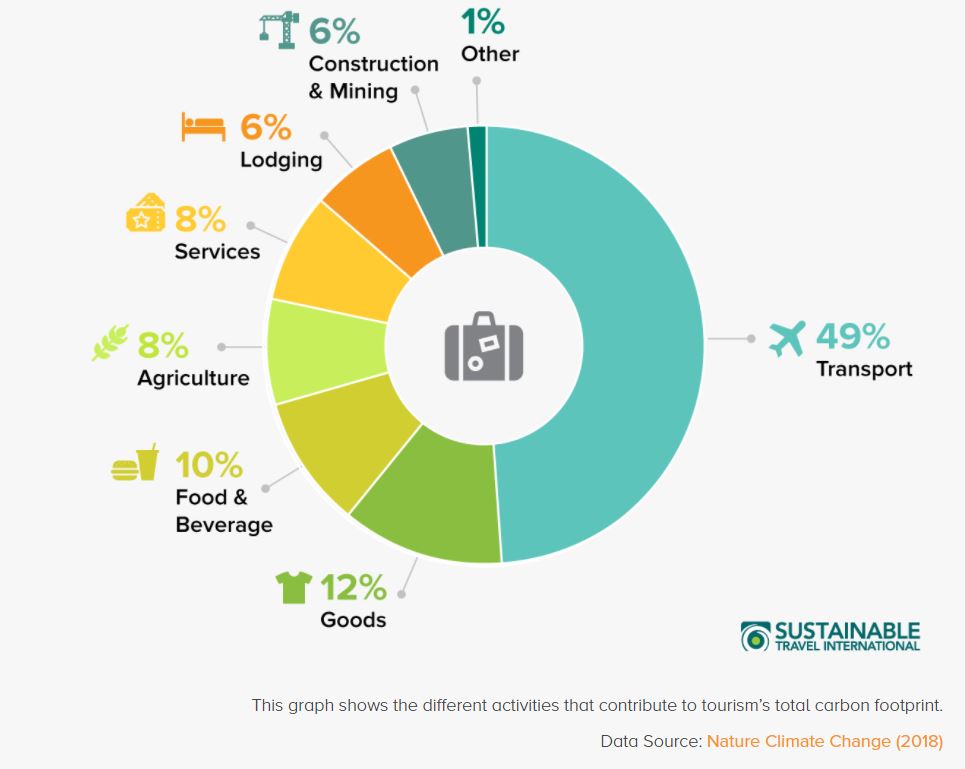On the Way to Sustainable Tourism?
The UN Climates Change Conference 2021 took place last November, and the world is still digesting the results of the Glasgow Climate Pact. What is certain is that big things need to happen in all the fields of life for us to have a liveable future on this planet. The global tourism industry is one of the key players in the much-needed change.
The global tourism industry is responsible for approximately eight percent of the carbon emissions of the world[i] Tourism is mostly about intangible experiences utilizing the multifaceted cultural and natural environments. Nevertheless, tourism accelerates nature loss via, e.g., land use, erosion and producing garbage. The division of the carbon footprint of global tourism consists of many sectors of hospitality, even construction and mining, as can be seen in the picture below by Sustainable Travel International.

More than 300 tourism stakeholders launched the “Glasgow Declaration of Climate action in Tourism” during the climate conference in November[ii]. This is a good start but, of course, still, a modest one considering pre-pandemic travel and tourism accounted for 10.4% of global GDP, being also a significant employer whose’ direct, indirect and induced impacts accounted for 1 in 4 of all new jobs created globally[iii]. However, tourism is and has been a significant socio-economic booster and in many times the sole contributor to well-being in, e.g., rural areas.
Covid-19 pandemic has treated the travel industry severely all over the world with a state of zero tourism for weeks if not months in many destinations. In Finland, tourism and hospitality industries have also suffered greatly, although domestic tourism, especially during the summer months, has been able to compensate for some of the damage. However, Covid-19 has given us all an opportunity to re-think our priorities, values and travel patterns[iv]. The pause also made the consumers realize the positive and negative impacts of tourism[v]. An independent report commissioned by Booking.com argues, “83% of global travellers think sustainable travel is vital, with 61% saying the pandemic has made them want to travel more sustainably in the future”[vi]. Results by a study at Turku UAS suggest that the values and travel motivations by Finnish customers support sustainability. As travellers, Finns respect nature and understand the main principles of sustainable tourism. They are also interested in nature and local, authentic culture. More than half are willing to pay more when services and products are sustainable[vii]. However, studies also reveal that a responsible attitude is regrettably unlikely to materialize as concrete and sustainable choices of consumption. For example, every third traveller confessed that their main aim during a holiday is to relax and not to worry about the negative impacts of tourism[viii].
Case Finland
Sustainable tourism cannot be at the discretion of the travellers only. It is the responsibility of the tourism and hospitality companies, Destination Management Organizations (DMOs) and other service providers to be in charge of sustainable supply and make it easy for the consumers to make sustainable decisions. The objectives and incentives have to come from the top level. Finland and the City of Turku are both in the forefront of preventing climate change with aspiring objectives. Finland aims to be carbon neutral by the year 2035[ix]. In addition, it wants to be the world’s first fossil-free welfare society as well as a leading sustainable tourism destination. How to get there?
Visit Finland has launched a program called “Sustainable Travel Finland” (STF)[x] designed for Finnish tourism destinations and companies. The idea is that a tourism company first has to be certified by a recognized label. There are approximately 20 different certifications that are accepted currently, varying from national to global and covering various fields of tourism, e.g. accommodation, boat harbours, golf courses and events to whole destinations[xi]. Once the certification is in place, the journey towards STF mark stars. There are seven steps: 1) commitment 2) training 3) development plan 4) communications 5)verification and measuring 6) certification and audit, and finally 7) closing and continuous improvement[xii]. The aim is not only to encourage individual businesses but whole tourism destinations to become sustainable. The “carrot and stick” mentality used by Visit Finland may mean that those companies who are not changing the way they act will not be included in international marketing activities in the future.
The City of Turku aims to be carbon neutral by the year 2029[xiii]. Its Destination Management Organization, “Visit Turku” together with Turku Business Region – a regional development company[xiv], are the mentors of the local tourism and hospitality industry who advise, train and even help finance the sustainability change in Finland Proper region. It is encouraging to see that the change is happening and sustainable choices are possible. Travellers can search for alternatives, e.g. via Visit Finland’s links: https://www.visitfinland.com/sustainable-finland/sustainable-travel-destinations/
It is not possible to stop travelling altogether. Therefore, it is the duty of the industry to make the change happen, but also the travellers have to stay alert and demand for sustainable solutions.
Written by Susanna Saari, Turku University of Applied Sciences
References:
[i] https://sustainabletravel.org/issues/carbon-footprint-tourism/
[ii] https://www.unwto.org/news/tourism-unites-behind-the-glasgow-declaration-on-climate-action-at-cop26
[iii] https://wttc.org/Research/Economic-Impact
[iv] Glusac, E. (2021) Global Wellness Trend Report. The Future of Wellness. Global Wellness Summit.
[v] Gybels, M. (2021) Sustainable Travel Report 2021. Booking.com
[vi] Gybels, M. (2021) Sustainable Travel Report 2021. Booking.com
[vii] Haapaniemi, T. (2021) Kuluttajien arvomaailma matkailutuotteita ostettaessa. Turun ammattikorkeakoulu
[viii] Gybels, M. (2021) Sustainable Travel Report 2021. Booking.com
[ix]https://ym.fi/en/climate-neutral-finland-2035#:~:text=Government’s%20climate%20policy%3A%20climate%2Dneutral,and%20strengthening%20our%20carbon%20sinks.
[x] https://www.businessfinland.fi/en/do-business-with-finland/visit-finland/sustainable-travel-finland-label
[xi] https://www.businessfinland.fi/suomalaisille-asiakkaille/palvelut/matkailun-edistaminen/vastuullisuus/sertifioinnit–ohjelmat
[xii] https://www.businessfinland.fi/suomalaisille-asiakkaille/palvelut/matkailun-edistaminen/vastuullisuus/sustainable-travel-finland


